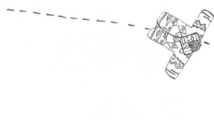
Overview
- Opens up a neglected discussion about the importance of travel theory and transnationalism with avant-garde writers
- Incorporates a vast amount of interdisciplinary research including postcolonial theory, mobility studies, literary history, and queer and translation theories
- Provides a comprehensive account of avant-garde writers across the twentieth century who traveled in countries as diverse as India, Lebanon, Morocco, and China.
Access this book
Tax calculation will be finalised at checkout
Other ways to access
About this book
This study explores the work of Western avant-garde writers who traveled to and wrote about Asia and North Africa. Though exoticist in outlook, many of these writers were also anti-colonialist and thus avoided some of the pitfalls of academic orientalism by assuming an aesthetics of diversity while employing strategies of provocation and reciprocity. As a survey of works on travel (including essays, novels, poems, and plays), the book challenges or modifies many postcolonial assumptions about Western writers on the Orient: from the French Surrealists to the American Beats and even transnational authors of the new millennium. Through a synthesis of avant-garde, postcolonial, and travel literature theories, Avant-garde Orientalism works in the best tradition of comparative literary study to identify and analyze a distinct category of world literature.
Similar content being viewed by others
Keywords
Table of contents (7 chapters)
Reviews
“Sweet avoids the pitfall of generalization and is careful to analyze what sets his many authors apart thanks to his method of ‘simultaneous cultural contrasts’ (Robert Delaunay), which makes it possible to expose starkly different and oftentimes contradictory portraits of the Orient, including several transnational English-language authorsof the new millennium.” (Tom Conner, French Review, Vol. 92 (3), March, 2019)
“Sweet recognizes that ‘avant-garde principles of formal innovation … reinforce traditional orientalist discursive practice while also, at crucial moments, radically altering it’ (2). Thus, Sweet is not trying to replace critical readings with positive ones but rather to recuperate visions of radical acceptance within moments that also reassert stereotypes.” (Kyle Garton-Gundling’s, ALH Online Review, May, 2018)
“Sweet concludes his monograph by arguing how avant-garde orientalism is a type of World Literature that differs from other orientalist literatures through its ‘alternating strategies of aggression and reciprocity’ as well as its ‘genuine commitment to alterity, the alterity of an imaginary, participatory future … .” (Joey S. Kim, Postcolonial Studies, February, 2018)
“[T]his is an original topic. For too long postcolonial approaches, at least in French and francophone studies, have veered away from metropolitan canonical/radical narrative as an area of inquiry (a major strand of this study). [David LeHardy Sweet] provides an ambitiously large transnational conspectus. Taking forward postcolonial ideas through literature produced on home territory is timely and part of a trend towards more diverse applications of postcolonial thought.” (Susan Harrow, Ashley Watkins Professor of French, University of Bristol)
“The work is […] boldly creative, witty and provocative. Dr. Sweet’s discussion is nuanced and complex but in a style that shows verve and flair. I found myself putting exclamation points in the margins in response to the author’s acute and insightful claims.” (Keith Gandal, Professor of English, The City College of New York, CUNY)
“In Avant-Garde Orientalism, David Sweettakes on a body of writing by twentieth-century authors who traveled to North Africa, the Middle East, and South Asia, critical of the politics and mainstream culture of the West while experimenting with literary modes and forms. Through a series of careful and provocative readings of figures from Gide, Bowles, and Durrell, to Burroughs, Pynchon and Ghosh, he forces us to reconsider the place of their work in postcolonial discourse, without ignoring its complicity in Orientalism. His nuanced and non-apologetic critical survey of some of the most important and complex works of twentieth-century fiction and travel writing elicits a commitment to a future in which radical alterity might be the grounds for global politics.” (Brian T. Edwards, Northwestern University, author of After the American Century: The Ends of U.S. Culture in the Middle East)
Authors and Affiliations
About the author
Bibliographic Information
Book Title: Avant-garde Orientalism
Book Subtitle: The Eastern 'Other' in Twentieth-Century Travel Narrative and Poetry
Authors: David LeHardy Sweet
DOI: https://doi.org/10.1007/978-3-319-50373-8
Publisher: Palgrave Macmillan Cham
eBook Packages: Literature, Cultural and Media Studies, Literature, Cultural and Media Studies (R0)
Copyright Information: The Editor(s) (if applicable) and The Author(s) 2017
Hardcover ISBN: 978-3-319-50372-1Published: 01 February 2017
Softcover ISBN: 978-3-319-84383-4Published: 13 July 2018
eBook ISBN: 978-3-319-50373-8Published: 20 January 2017
Edition Number: 1
Number of Pages: XIII, 318
Topics: Twentieth-Century Literature, Postcolonial/World Literature, Comparative Literature, Contemporary Literature



